Plot summary
The book focuses on Fitzwilliam Darcy's initial visit to Hertfordshire during the opening chapters of Pride and Prejudice , as seen from his viewpoint. The book begins as he arrives in the town of Meryton, to stay at Charles Bingley's estate of Netherfield. Darcy expects to be bored by provincial manners and society, and he finds that is the case at a local town ball. To his surprise, however, he becomes fascinated by Elizabeth Bennet, whom he has accidentally offended due to her inadvertently overhearing a tactless comment that he made about her to Bingley.
Darcy is uncomfortable in his current surroundings, and he worries about his sister Georgiana, who is vulnerable following an unpleasant encounter with George Wickham. Amidst attempts of unwelcome advance by Bingley's sister Caroline, he finds himself repeatedly thrown into Elizabeth's company, particularly when her sister Jane falls ill whilst visiting Netherfield, forced to stay until she recovers. Darcy comes to admire Elizabeth's lively spirit, generous nature and confident refusal to be cowed by her social 'betters'. However, Elizabeth is without money or fine connections, and she has embarrassing and 'unfortunate' relations that make her unsuitable for a wife. Meanwhile, protective of his friend, the somewhat naive and easily trusting Bingley, Darcy attempts to warn him off from an 'unfortunate' and hasty relationship with Jane Bennet whilst struggling with his feelings for Elizabeth.
Eventually, Darcy is determined to explore his feelings for Elizabeth despite his misgivings, resolving to both make amends and attempt to charm Elizabeth during a ball that Bingley is holding. Unfortunately, despite the assistance he receives from his valet Fletcher, fate has conspired against Darcy: Wickham has recently moved into the area, joined the local militia, and become acquainted with Elizabeth. As such, when he dances with Elizabeth at the ball, Darcy meets with extremely cold and unfriendly treatment from her. He realizes that Wickham has managed to poison Elizabeth against him with false tales of their previous dealings, and that she (and others in the village) have become distant towards him because of their perceptions of his arrogance and Wickham's charming nature and lies.
Too proud to set the record straight, Darcy refuses to defend himself. Worse, Bingley's unguarded behaviour towards Jane Bennet, her mother's tactless gloating and more examples of ill-breeding from her family strengthen Darcy's conviction that he must prevent his friend's potential ruin at all costs. Darcy dissuades him from marrying Jane Bennet, detecting in her no hint of regard for his friend beyond politeness. Realizing that his intervention (were she to learn of it) would permanently alienate Elizabeth, he still, Darcy resolves to act in what he sees as the best interests of his friend. The next day, as the Netherfield party returns to London, Darcy sows the seeds of doubt in Bingley's mind about Jane's regard for him, convincing Bingley not to return to Netherfield and declare his intentions to Jane. The novel ends with Darcy resolving to harden his heart and forget about Elizabeth.
References to historical people, places, and events
The events of this novel, unlike those of Pride and Prejudice, are set in a specific time, late 1811, as shown by the dates of letters exchanged between the characters. This allows the author to include historical people and events in the narrative.
After departing Meryton, Darcy goes to London to spend time at his townhouse, "Erewile" on Grosvenor Square, before proceeding to Pemberley for Christmas. While in London, he and Bingley are invited to a soirée at the London home of Viscount Melbourne. There he sees couples dancing the waltz for the first time. At the time, dancing was done in groups, and it was risqué for men and women to dance closely face to face. The waltz was imported from Europe and became popular around 1815. Darcy encounters Beau Brummel. He talks with Lady Melbourne and is witness to the scandalous behaviour of her daughter-in-law, Lady Caroline Lamb, who enters wearing a dress of sheer material that has been sprinkled with water and is translucent. Her companion is unknown to Darcy, but he is later revealed to be Lord Byron. Darcy, Bingley and most of the other guests leave the party immediately.
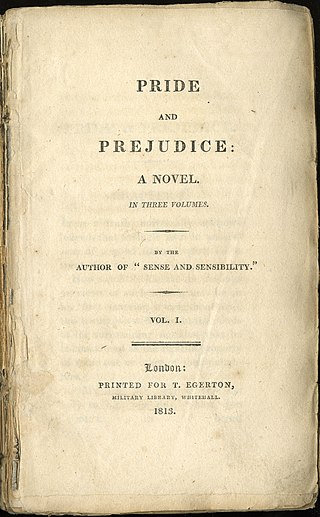
Pride and Prejudice is the second novel by English author Jane Austen, published in 1813. A novel of manners, it follows the character development of Elizabeth Bennet, the protagonist of the book, who learns about the repercussions of hasty judgments and comes to appreciate the difference between superficial goodness and actual goodness.

Pride and Prejudice is a six-episode 1995 British television drama, adapted by Andrew Davies from Jane Austen's 1813 novel of the same name. Jennifer Ehle and Colin Firth starred as Elizabeth Bennet and Fitzwilliam Darcy, respectively. Produced by Sue Birtwistle and directed by Simon Langton, the serial was a BBC production with additional funding from the American A&E Network. BBC1 originally broadcast the 55-minute episodes from 24 September to 29 October 1995. The A&E Network aired the series in double episodes on three consecutive nights beginning 14 January 1996.

Bride and Prejudice is a 2004 romantic comedy-drama film directed by Gurinder Chadha. The screenplay by Chadha and Paul Mayeda Berges is a Bollywood-style adaptation of Jane Austen's 1813 novel Pride and Prejudice. Shot primarily in English, with some Hindi and Punjabi dialogue, the film was released in the United Kingdom on 6 October 2004 and in the United States on 11 February 2005 to mostly positive reviews from critics.
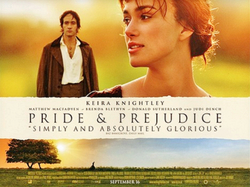
Pride & Prejudice is a 2005 romantic drama directed by Joe Wright, in his feature directorial debut, and based on Jane Austen's 1813 novel of the same name. The film features five sisters from an English family of landed gentry as they deal with issues of marriage, morality and misconceptions. Keira Knightley stars as Elizabeth Bennet, while Matthew Macfadyen plays her romantic interest Mr Darcy.
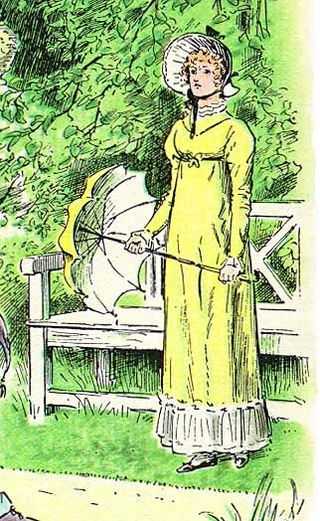
Elizabeth Bennet is the protagonist in the 1813 novel Pride and Prejudice by Jane Austen. She is often referred to as Eliza or Lizzy by her friends and family. Elizabeth is the second child in a family of five daughters. Though the circumstances of the time and environment push her to seek a marriage of convenience for economic security, Elizabeth wishes to marry for love.

Pride and Prejudice is a 1940 American film adaptation of Jane Austen's 1813 novel Pride and Prejudice, starring Greer Garson and Laurence Olivier. Directed by Robert Z. Leonard, the screenplay was written by Aldous Huxley and Jane Murfin, adapted specifically from the stage adaptation by Helen Jerome, in addition to Jane Austen's novel. The story is about five sisters from an English family of landed gentry who must deal with issues of marriage, morality and misconceptions. The film was released on July 26, 1940 in the United States by MGM and was critically well received. The New York Times film critic praised the film as "the most deliciously pert comedy of old manners, the most crisp and crackling satire in costume that we in this corner can remember ever having seen on the screen."

Pride & Prejudice: A Latter-Day Comedy is a 2003 independent romantic comedy film directed by Andrew Black and produced by Jason Faller. The screenplay, by Anne Black, Jason Faller, and Katherine Swigert, is an adaptation of Jane Austen's 1813 novel Pride and Prejudice set in modern-day Provo, Utah. The film stars Kam Heskin as college student Elizabeth Bennet whose dreams of becoming an author supersede the cultural and societal pressures to be married. Elizabeth tries to escape the advances of several bachelors, including handsome but haughty businessman Will Darcy.
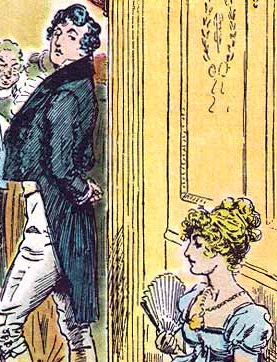
Fitzwilliam Darcy Esquire, generally referred to as Mr. Darcy, is one of the two central characters in Jane Austen's 1813 novel Pride and Prejudice. He is an archetype of the aloof romantic hero, and a romantic interest of Elizabeth Bennet, the novel's protagonist. The story's narration is almost exclusively from Elizabeth's perspective; the reader is given a one-sided view of Darcy for much of the novel, but hints are given throughout that there is much more to his character than meets the eye. The reader gets a healthy dose of dramatic irony as Elizabeth continually censures Mr. Darcy's character despite the aforementioned hints that Mr. Darcy is really a noble character at heart, albeit somewhat prideful. Usually referred to only as "Mr. Darcy" or "Darcy" by characters and the narrator, his first name is mentioned twice in the novel.
Fitzwilliam Darcy, Gentleman is the collective name given to a trilogy of historical romance novels written by Pamela Aidan. As the title suggests, they are based heavily on Jane Austen's 1813 novel Pride and Prejudice, and feature many events of the novel as seen from the perspective of Mr. Fitzwilliam Darcy, the central male character of Austen's novel.

Duty and Desire is a 2004 historical romance novel by Pamela Aidan. The second in the Fitzwilliam Darcy, Gentleman trilogy, the novel examines Jane Austen's 1813 Pride and Prejudice from the perspective of Fitzwilliam Darcy, the central male character of that novel.

These Three Remain is a 2005 historical romance novel by Pamela Aidan. It is the third and final novel in the Fitzwilliam Darcy, Gentleman trilogy, a series of novels examining Jane Austen's 1813 novel Pride and Prejudice from the perspective of Fitzwilliam Darcy, the central male character of that book.
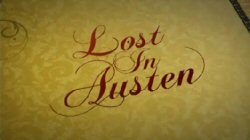
Lost in Austen is a four-part 2008 British television series for the ITV network, written by Guy Andrews as a fantasy adaptation of the 1813 novel Pride and Prejudice by Jane Austen. Amanda, a young woman living in modern London, enters the plot of the novel through a portal in her bathroom, to join the Bennet family and affect events, generally disastrously.

Pride and Prejudice and Zombies is a 2009 parody novel by Seth Grahame-Smith. It is a mashup combining Jane Austen's classic 1813 novel Pride and Prejudice with elements of modern zombie fiction, crediting Austen as co-author. It was first published in April 2009 by Quirk Books and in October 2009 a Deluxe Edition was released, containing full-color images and additional zombie scenes. The novel was adapted into a 2016 film starring Lily James and Sam Riley.

Mr William Collins is a fictional character in the 1813 novel Pride and Prejudice by Jane Austen. He is the distant cousin of Mr Bennet, a clergyman and holder of a valuable living at the Hunsford parsonage near Rosings Park, the estate of his patroness Lady Catherine De Bourgh, in Kent. Since Mr and Mrs Bennet have no sons, Mr Collins is also the current heir presumptive to the Bennet family estate of Longbourn in Meryton, Hertfordshire, due to the estate being entailed to heirs male. Mr Collins is first introduced during his visit to Longbourn. His dull-witted character is in parallel to another 'Austen' character, Mr. Rushworth, from Mansfield Park. Mr Collins is also somewhat comparable to the Shakespearean character, Malvolio, from Twelfth Night.

Death Comes to Pemberley is a 2011 mystery fiction novel by British writer P.D. James that continues Jane Austen's 1813 novel Pride and Prejudice with a murder mystery.

The Lizzie Bennet Diaries is an American web series adapted from Jane Austen's 1813 novel Pride and Prejudice. The story is conveyed in the form of vlogs. It was created by Hank Green and Bernie Su, produced by Jenni Powell and stars Ashley Clements, Mary Kate Wiles, Laura Spencer, Julia Cho and Daniel Vincent Gordh. It premiered on a dedicated YouTube channel on April 9, 2012, and subsequently concluded when the 100th episode was posted on March 28, 2013.

The Bennet family is a fictional family created by the English novelist Jane Austen in her 1813 novel Pride and Prejudice. The family consists of Mr and Mrs Bennet and their five daughters: Jane, Mary, Catherine, Lydia, and Elizabeth, who is the novel's protagonist.
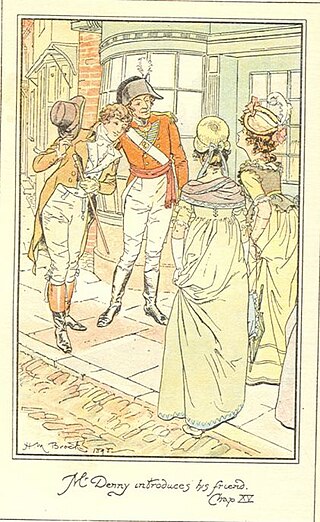
George Wickham is a fictional character created by Jane Austen who appears in her 1813 novel Pride and Prejudice. George Wickham is introduced as a militia officer who has a shared history with Mr. Darcy. Wickham's charming demeanour and his story of being badly treated by Darcy attracts the sympathy of the heroine, Elizabeth Bennet, to the point that she is warned by her aunt not to fall in love and marry him. It is revealed through the course of the story that George Wickham's true nature is that of a manipulative unprincipled layabout, a ne'er-do-well wastrel, compulsive liar and a degenerate, compulsive gambler, a seducer and a libertine, living the lifestyle of a rake. Lacking the finances to pay for his lifestyle, he gambles regularly and cons credit from tradesmen and shopkeepers and skips out on paying-up.
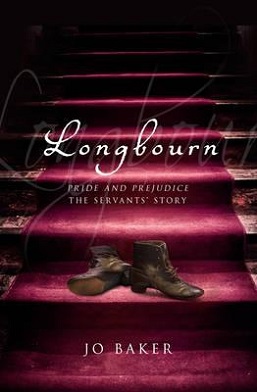
Longbourn is a 2013 novel by the British author Jo Baker. It gives an alternative view of the events in Jane Austen's 1813 novel Pride and Prejudice, telling the story from the perspective of the servants at Longbourn, the Bennet family home. It was published by Doubleday in the UK and by Knopf in the US. It has been translated into twenty-one languages, was shortlisted for the IBW Book Award and is due to be made into a film, adapted by Angela Workman and Jessica Swale and directed by Sharon Maguire.


















